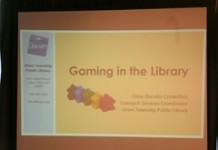 Bill McCoy, one of the more open-minded folks at Adobe about many things, took a little jab at me for supposedly being boosterish about the e-reads displacing p-books at the University of Arizona. He worried that the students would not engage sufficiently in sustained thought.
Bill McCoy, one of the more open-minded folks at Adobe about many things, took a little jab at me for supposedly being boosterish about the e-reads displacing p-books at the University of Arizona. He worried that the students would not engage sufficiently in sustained thought.
I’ll do a very limited mea culpa, in that I merely quoted from the newspaper there rather than saying, “This is good.” I ran the item without pointing to an earlier TeleBlog post headlined Ammo for Luds: P-book purge at University of Texas undergrad library. I’ve done my best to deflate the hype that has afflicted e-bookdom. What’s more, an important point of the TeleRead plan has been the encouragement of e-books as promoters of sustained thought. In the FAQ for this site, I note:
Traditional books should be TeleRead’s main focus–since they encourage sustained thought, and since they are the medium most vulnerable to digital piracy. Serious books could eventually lose out if present trends continue. Most Internet users would rather communicate with each other than read books, especially given the limits of the present technology, and the growth of Hollywood glitz on computer networks will be yet another distraction. Already just a small minority of Americans are regular book buyers.
So, Bill, you can see I share your concerns. Casual surfing is fine, especially if the surfers encounter blog items that point to books; but, yes, we need both kinds of reading. And unwittingly you proved your own point about the risks of students hopping around from Web site to Web site without sufficient attention or thought. If you’d been reading a book rather than a blog, you might have understood my priorities better. Hey, it’s the nature of the Web. I blame it, not you. TeleRead, anyone? I’ve suggested that we systematically bring e-books to our nation’s schools and libraries. It isn’t enough just to get the e-books online without changing education and librarianship so that students can get the most out of the technology–or, to be more exact, the content.
Meanwhile, in the Sustained Thought Department, I believe that Adobe could help a lot by going all the way for an XML/CSSish approach to make e-books easier read for long intervals. I can’t stand parking myself in front of a desktop to read books. My real preference is to read e-books on a tablet, but for travel I like PDAs, and they’re not exactly the optimal hardware for an Adobe-style approach. Think of all the students with PDAs and cellphones. If Adobe wants to encourage immersive reading, it would be wise to phase in a PDA- and cellphone-friendly format that at the same time would render exquisitely on larger screens.
Reminder: Bill speaks for himself and not necessararily for Adobe. Sometimes I agree with his opinions, sometimes I don’t, but I love reading his blog, especially his advocacy of an MP3 for e-books.
Related: Bill might also took a look at E-Books and Homer Hickam: The school-library connnection.
Housekeeping note: As regular followers of this blog know, I hate OpenReader.org’s ugly site. Stay tuned for the new one next week, complete with a page on how an XML/CSSish standard could help companies such as Adobe. If we want e-books to catch on, then we need standards, the same as we have for CDs and railroad tracks.






























